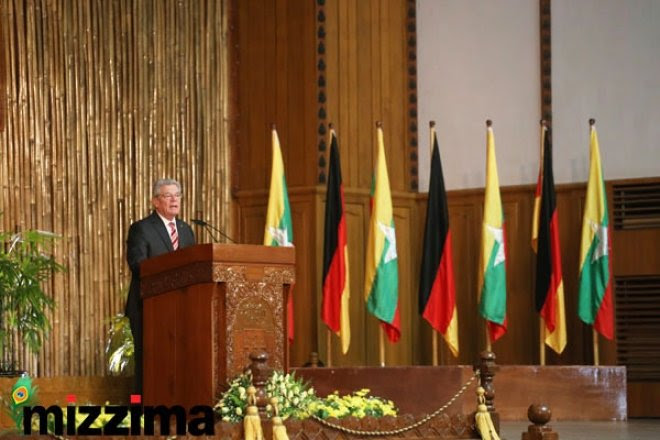Germany is ready to support Myanmar as it continues democratic reforms, President Joachim Gauck said in a speech at Yangon University on February 11.

The German head of state said his country was ready to play a partnership role to help Myanmar in whatever way possible as the reform process continued.
Mr Gauck said this included assisting with constitutional reform, which he had discussed in Nay Pyi Taw the previous day during meetings with President U Thein Sein, National League for Democracy leader Daw Aung San Suu Kyi and members of parliament.
The German president said his country was also keen to help with economic development in Myanmar, but added that foreign businesses were waiting for changes in investment laws before investing in the country.
Mr Gauck expressed concern about religious conflict in Myanmar.
“In Myanmar, the coexistence of pagodas, mosques and churches is a symbol of religious harmony, but Germany is concerned about the news of conflict between Buddhists and Muslims,” he said.
Referring to the Rohingya, Mr Gauck said they were part of Myanmar society.
In an apparent reference to the estimated 100,000 Rohingya sheltering in camps in Rakhine State following communal violence there since 2012, Mr Gauck said they should have “secure, reliable and legitimate” living conditions and have opportunities to support themselves.
“We welcome efforts to this end,” he said.
Economic cooperation was a focus of the visit, with Germany waiving half of the 1,084 million euros in debt owed to it by Myanmar under an agreement signed in Nay Pyi Taw in the presence of the presidents of the two countries. The remaining 542 million euros (K731,393,142,295) will be repaid over 15 years at an interest rate of three percent.
An agreement to implement a rural infrastructure program with German assistance totaling 7 million euros was discussed with the Ministry of National Planning and Economic Development.
Germany has also agreed to provide a grant of 15 million euros to be used for vocational training, cottage industries, assistance for the banking sector and capacity building programs for government and non-government organizations.
Mr Gauck also meet a range of civil society organizations, including members of the 88 Generation Peace and Open Society group, for discussions which ranged from the peace talks between the government and armed ethnic groups to trade unions and the rights of workers.
Mr Gauck left Myanmar on February 11 after a reception hosted in his honour at the Chatrium Hotel in Yangon at which he reiterated in a speech Germany’s eagerness to assist Myanmar during the transition process.
He is the first German president to visit Myanmar since Richard Von Weizsacker in 1986.


